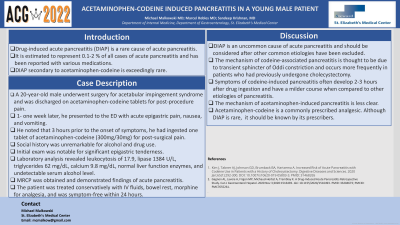Back


Poster Session A - Sunday Afternoon
Category: Biliary/Pancreas
A0040 - Acetaminophen-Codeine-Induced Pancreatitis in a Young Male Patient
Sunday, October 23, 2022
5:00 PM – 7:00 PM ET
Location: Crown Ballroom

Has Audio

Michael Malkowski, MD
St. Elizabeth's Medical Center, Tufts University School of Medicine
Boston, MA
Presenting Author(s)
Michael Malkowski, MD1, Marcel R. Robles, MD2, Sandeep Krishnan, MBBS, PhD3
1St. Elizabeth's Medical Center, Tufts University School of Medicine, Boston, MA; 2Tufts University School of Medicine, St. Elizabeth's Medical Center, Boston, MA; 3St. Elizabeth's Medical Center, Tufts University School of Medicine, Brighton, MA
Introduction: Drug-induced acute pancreatitis (DIAP) is a rare cause of acute pancreatitis. It is estimated to represent 0.1-2 % of all cases of acute pancreatitis and has been reported with various medications. However, DIAP secondary to acetaminophen-codeine is exceedingly rare.
Case Description/Methods: A 20-year-old male who underwent recent surgery for acetabular impingement syndrome presented to the ED with acute epigastric pain, nausea, and vomiting. He noted that 3 hours prior to the onset of symptoms, he had ingested one tablet of acetaminophen-codeine (300mg/30mg) for post-surgical pain. He reported prior use of the medication as needed for the past 7-days without adverse effects. He denied the use of alcohol. Initial exam was notable for significant epigastric tenderness. Laboratory analysis revealed leukocytosis of 17.9, lipase 1384 U/L, triglycerides 62 mg/dL, calcium 9.8 mg/dL, normal liver function enzymes, and undetectable serum alcohol level. Abdominal US was unremarkable for biliary and gallbladder pathology. MRCP was obtained and demonstrated pancreatic edema, a small amount of peripancreatic fluid, and a mildly prominent proximal common hepatic duct measuring 8mm. The patient was treated conservatively with IV fluids, bowel rest, morphine for analgesia, and was symptom-free within 24 hours.
Discussion: DIAP, also known as medication-induced acute pancreatitis (MIAP), represents an uncommon cause of acute pancreatitis. It should be considered after other common etiologies have been excluded. The mechanism of codeine-associated pancreatitis is thought to be due to transient sphincter of Oddi constriction with a predilection in patients who had previously undergone cholecystectomy. Symptoms often develop 2-3 hours after drug ingestion and have an overall milder course when compared to other etiologies of pancreatitis. Moreover, the mechanism of acetaminophen-induced pancreatitis is less clear. Although our patient used acetaminophen-codeine combination tablets, we speculate that codeine was the causative medication, as our patient previously used acetaminophen without any adverse symptoms. Furthermore, the time course of symptom onset and the rapid resolution of symptoms is more fitting with previously documented cases of codeine-associated pancreatitis. Acetaminophen-codeine is one of the most prescribed pain medications, and although rare, DIAP is a possible consequence of its use and should be known by its prescribers.
Disclosures:
Michael Malkowski, MD1, Marcel R. Robles, MD2, Sandeep Krishnan, MBBS, PhD3. A0040 - Acetaminophen-Codeine-Induced Pancreatitis in a Young Male Patient, ACG 2022 Annual Scientific Meeting Abstracts. Charlotte, NC: American College of Gastroenterology.
1St. Elizabeth's Medical Center, Tufts University School of Medicine, Boston, MA; 2Tufts University School of Medicine, St. Elizabeth's Medical Center, Boston, MA; 3St. Elizabeth's Medical Center, Tufts University School of Medicine, Brighton, MA
Introduction: Drug-induced acute pancreatitis (DIAP) is a rare cause of acute pancreatitis. It is estimated to represent 0.1-2 % of all cases of acute pancreatitis and has been reported with various medications. However, DIAP secondary to acetaminophen-codeine is exceedingly rare.
Case Description/Methods: A 20-year-old male who underwent recent surgery for acetabular impingement syndrome presented to the ED with acute epigastric pain, nausea, and vomiting. He noted that 3 hours prior to the onset of symptoms, he had ingested one tablet of acetaminophen-codeine (300mg/30mg) for post-surgical pain. He reported prior use of the medication as needed for the past 7-days without adverse effects. He denied the use of alcohol. Initial exam was notable for significant epigastric tenderness. Laboratory analysis revealed leukocytosis of 17.9, lipase 1384 U/L, triglycerides 62 mg/dL, calcium 9.8 mg/dL, normal liver function enzymes, and undetectable serum alcohol level. Abdominal US was unremarkable for biliary and gallbladder pathology. MRCP was obtained and demonstrated pancreatic edema, a small amount of peripancreatic fluid, and a mildly prominent proximal common hepatic duct measuring 8mm. The patient was treated conservatively with IV fluids, bowel rest, morphine for analgesia, and was symptom-free within 24 hours.
Discussion: DIAP, also known as medication-induced acute pancreatitis (MIAP), represents an uncommon cause of acute pancreatitis. It should be considered after other common etiologies have been excluded. The mechanism of codeine-associated pancreatitis is thought to be due to transient sphincter of Oddi constriction with a predilection in patients who had previously undergone cholecystectomy. Symptoms often develop 2-3 hours after drug ingestion and have an overall milder course when compared to other etiologies of pancreatitis. Moreover, the mechanism of acetaminophen-induced pancreatitis is less clear. Although our patient used acetaminophen-codeine combination tablets, we speculate that codeine was the causative medication, as our patient previously used acetaminophen without any adverse symptoms. Furthermore, the time course of symptom onset and the rapid resolution of symptoms is more fitting with previously documented cases of codeine-associated pancreatitis. Acetaminophen-codeine is one of the most prescribed pain medications, and although rare, DIAP is a possible consequence of its use and should be known by its prescribers.
Disclosures:
Michael Malkowski indicated no relevant financial relationships.
Marcel Robles indicated no relevant financial relationships.
Sandeep Krishnan indicated no relevant financial relationships.
Michael Malkowski, MD1, Marcel R. Robles, MD2, Sandeep Krishnan, MBBS, PhD3. A0040 - Acetaminophen-Codeine-Induced Pancreatitis in a Young Male Patient, ACG 2022 Annual Scientific Meeting Abstracts. Charlotte, NC: American College of Gastroenterology.
